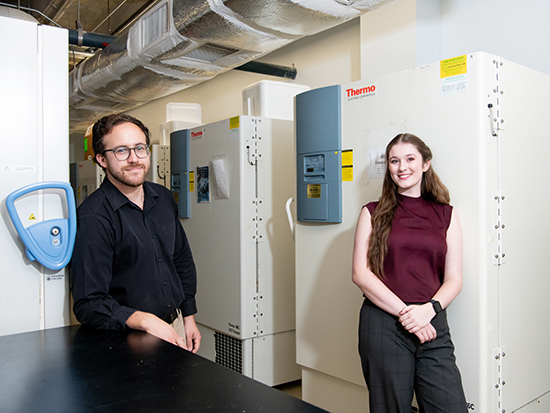Written by: Matt Windsor
Media contact: Tehreem Khan
 UAB Sustainability Coordinator Nick Ciancio and Green Labs Coordinator Emily Colpack in a "freezer farm" in the Civitan International Research Center. UAB efforts to prevent carbon dioxide emissions were recognized with a 2024 Better Practice Award from the Department of Energy. Photo by Jennifer Alsabrook-TurnerInitiatives championed by UAB Sustainability have led to national recognition this spring from the Department of Energy and pro-bono consulting services to help expand sustainability work on campus.
UAB Sustainability Coordinator Nick Ciancio and Green Labs Coordinator Emily Colpack in a "freezer farm" in the Civitan International Research Center. UAB efforts to prevent carbon dioxide emissions were recognized with a 2024 Better Practice Award from the Department of Energy. Photo by Jennifer Alsabrook-TurnerInitiatives championed by UAB Sustainability have led to national recognition this spring from the Department of Energy and pro-bono consulting services to help expand sustainability work on campus.
At a recent meeting of the Department of Energy’s Better Buildings Better Plants Summit in Washington, D.C., University of Alabama at Birmingham Sustainability Coordinator Nick Ciancio presented on the Green Labs Program and Rheaply Pilot Program at UAB. Ciancio also accepted one of the initiative’s 2024 Better Practice Awards in the Better Buildings category on behalf of UAB. The Better Buildings Better Plants annual awards highlight innovative and industry-leading accomplishments in implementing and promoting practices, principles and procedures of energy management, according to the initiative’s website. UAB was one of only eight organizations, and one of only two universities, to receive awards this year.
Green Labs is a voluntary program, offered in collaboration between UAB Sustainability and UAB Environmental Health & Safety, that assists individual labs in implementing efficiency measures that reduce environmental and economic costs without sacrificing research quality, safety standards, or comfort and productivity of lab staff. UAB has prevented more than 680 tons of carbon dioxide emissions through changes in freezer operations because of Green Labs as part of the International Freezer Challenge competition. (UAB has won that competition three times in the higher education division.)
Rheaply is a shared resource platform, implemented at UAB in August 2023, that allows researchers to post unneeded items (equipment and supplies) that other labs can have, or post about items they need, with the goal of saving on duplicate purchases. UAB Sustainability has trained more than 300 individuals to use the Rheaply shared resource platform, resulting in savings of nearly $140,000 and avoiding nearly five tons of carbon dioxide emissions.
“Partners in the Better Buildings Challenge are industry leaders in energy efficiency and decarbonization,” said Carolyn Snyder, Deputy Assistant Secretary for Buildings and Industry at the U.S. Department of Energy, in announcing the award recipients. “As a winner of a Better Practice award, the University of Alabama at Birmingham has demonstrated an innovative pathway to improve energy efficiency and reduce emissions that other organizations can learn from.”
Encouraging sustainable research practices, along with a “Green Labs culture” across UAB, are specific strategic objectives and activities included in the Environmental Stewardship Foundation of Forging Ahead, UAB’s strategic plan for 2024-2028.
UAB Sustainability will be assisted in reaching those goals through another recent recognition. In March, UAB was one of six universities selected to receive pro bono consulting services worth up to $25,000 from the nongovernmental organization Second Nature. Consulting from Coho, a Second Nature partner specializing in renewable energy and resilient water projects, will assist UAB in studying the feasibility of electrifying the campus bus system (Blazer Express).
“Coho has an excellent track record of catalyzing bold climate action and facilitating feasible solutions for complex problems,” said UAB Sustainability Manager Bambi Ingram. “UAB has set transformative goals for decarbonizing our campus through our Sustainability Strategic Plan, and we look forward to benefiting from Coho’s extensive knowledge and experience in achieving emissions reductions.”